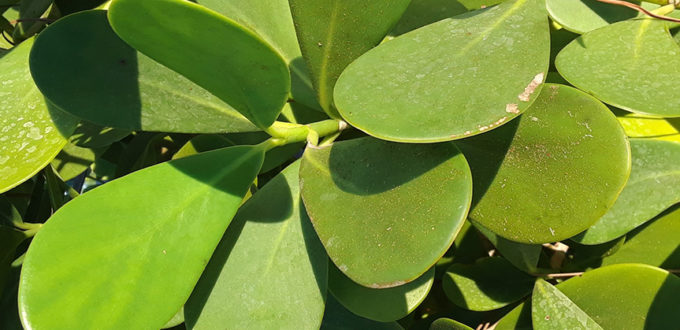Common Name: Autograph Tree, Pitch Apple, Balsam Apple, Copey
Scientific Name: Clusia rosea
Type of Plant: Shrub/Small Tree
Description: Clusia is a large genus of trees and shrubs native to the Caribbean characterized by their branches, which grow horizontally, and their leaves, which are thick and tough. The autograph tree has stiff, dark green or olive-colored leathery leaves that grow to about 8 inches long. The leaves are tough enough that they can be carved into, hence the common name “autograph tree.” It has long flower heads with pink or white flowers that bloom in the summer, followed by small green fruits that ripen to black and eventually split open to reveal bright red seeds. The seeds are very attractive to birds and other fauna. The autograph tree is commonly grown as an indoor plant.
Mature Size: 8-10′ tall x 8-10′ wide (can reach 25′ tall as a tree)
Blooms: White or Pink, Summer
Fruit: yes, inedible (toxic to humans and pets)
Climate Requirements: Full sun is best, but this plant can tolerate partial shade as well. This plant can be kept outside only in tropical areas, as will not tolerate temperatures below 50 degrees Fahrenheit.
Care Requirements: Fertilize three times per year in the spring, summer, and fall. You can do just one hard pruning in spring (late March or early April) and let it do its thing from there; with branch trimming only, never cut across foliage.
Spacing: Space plants 24-36″ apart
Water Needs: Average; the autograph tree should be watered regularly for the first year or so until the plant is fully established. You can scale back its water after that, although regular watering will help it grow more fully. This species is fairly drought-tolerant, but you should never let the soil get completely dry.
Maintenance: Low
Attracts: Birds during fruiting season
Special Uses/Attributes: The plant makes an excellent hedge because of its dense growth habit and its minimal maintenance needs. Alternatively, if you grow it tall as a tree, you can underplant things close to its base. The autograph tree is salt-tolerant and can be grown in exposed positions near the ocean.
Florida Native: No


